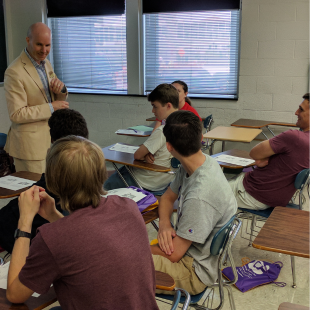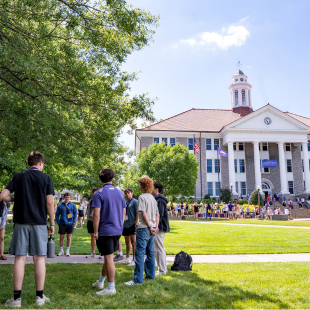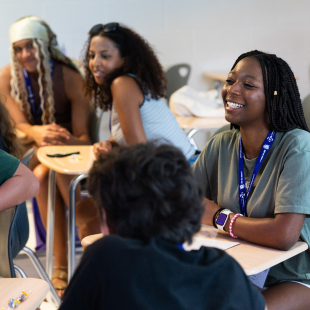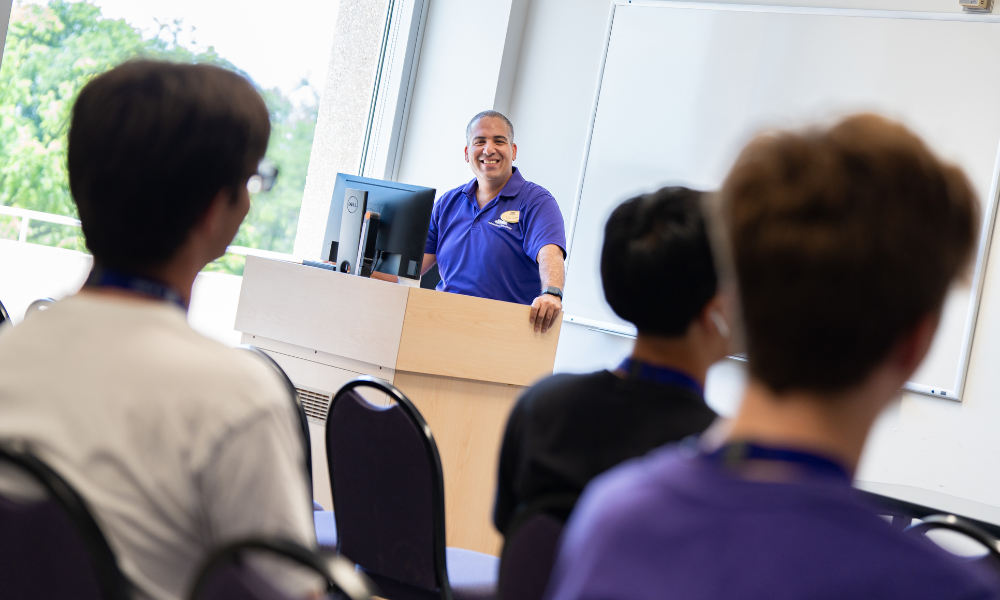The transition to college is a critical period in a student’s academic journey, and at JMU, the First Year Advising program plays a central role in ensuring that this transition is supported, intentional, and student-centered. Associate Director of University Advising Aimee Stright and Assistant Director of University Advising Jamie Whisman, who manage the First Year Advising Program in collaboration with Director of University Advising Marquis McGee, provide On Track with insights into the structure, impact, and evolution of the First Year Advising program.
What is the role and impact of the First Year Advising program at JMU in supporting incoming students during their transition to college?
Aimee Stright: The First Year Advising program within University Advising plays a crucial role in supporting incoming students during their transition to JMU. First-year advisors are specially trained faculty and primary-role advisors from across the different academic programs, representing each college on campus. In the 2024-2025 year, we had 91 advisors serving our incoming first-year students, 74% of whom were instructional faculty advisors. Each advisor has a small, major-specific caseload of students. First-year advisors assist students with developing and pursuing academic goals, understanding academic policies, enrollment in classes, academic planning, and learning how to function successfully within the university. Our students really enjoy working with their advisor- 89.3% of our students said that they felt that their academic advisor was a safe place to ask questions, even if the question was not academically related. Overall, 93% of our students were highly satisfied/satisfied with their first-year advising experience in August. From June to February, our advisors support incoming first-year students as they find their place at JMU. Ultimately, the partnership between first-year advisors and students is essential in laying a strong foundation for academic success and personal growth, ensuring that students are supported as they navigate their college journey.
How are First-year Advisors at JMU selected, trained, and supported, and what does the advising process look like from pre-enrollment through the transition to major advisors?
Aimee Stright: First-Year Advisors are identified, selected, and confirmed by each department by March each year. Our department trains advisors in cross-disciplinary areas, with a special focus on developmental advising. Our training program is extensive, as we want our advisors to be effective resources for their students. New advisors have an asynchronous canvas course they complete and pair that with a half-day training to engage with first-year advising-specific concepts, case studies, and teambuilding. Additionally, each new advisor has a seasoned advisor mentor who acts as an additional resource for them. This mentoring relationship has looked different as our program has grown, but the intention is that each new advisor has a sounding board for ideas, a safe place to ask questions, and a chance to connect with another First Year Advisor. All first-year advisors have 2 days of additional training (one in May and one in August) together with campus partners, learning about changes, trends in higher education, and advising as well as updates to the First Year Advising Program.
 What does the advising process look like from pre-enrollment through the transition to major advisors?
What does the advising process look like from pre-enrollment through the transition to major advisors?
Jamie Whisman: First Year Advising partners closely with Orientation to support students as they navigate through their One Book steps. The Orientation One Book is a one-stop shop that contains all the important steps, details, and information for new students to begin their transition to JMU. As incoming students work through their One Book steps, the Prepare for Class Enrollment modules are a series of Canvas modules created by First Year Advising. These modules help orient first-year students to understand curriculum at JMU, see how incoming credit will be received by JMU, and demystify the enrollment processes by providing detailed resources.
As students continue to work through their One Book steps and ultimately declare their major, they are assigned a first-year advisor. The first contact between students and their advisors occurs before enrollment in their first semester classes, which this year occurs on June 6. Prior to that point in time, the First Year Advising office handles all incoming student questions. During this initial interaction, advisors introduce themselves and guide students on how to schedule a virtual group advising session through My Madison Connect (the CRM). Our virtual group advising sessions are new this year and will feature small groups of each advisor's students – around 10-15 students per session- meeting on Zoom for about 75 minutes. Advisors will hold a series of sessions over the group advising timeline at a variety of times so that their students can best attend. A presentation will be provided for each advisor as well as activities to engage with students. Our program has been working with JMU libraries and will be providing best practices for engaging with students in a virtual space, virtual community guidelines, and similar to assist advisors with this online format. After group advising, all first-year students enroll in Fall classes. It is our hope that our students feel even more supported this year during this process as they will have had the opportunity to meet with their advisor prior to enrollment at Group Advising as well as go through their Prepare for Class Enrollment Modules in Canvas, attend supportive webinars hosted by First Year Advising, the Registrar’s Office and Transfer Initiatives, and similar. Our First Year Advisors and First Year Advising team will continue to support students as they finish their enrollment process, assisting with questions, enrollment support, as well as any administrative enrollment support as needed.
During Weeks of Welcome in August, advisors meet with their students in large group sessions to provide additional guidance on time management, understanding syllabi, as well as sharing tips and tricks for utilizing campus resources. This is also a time that advisors can support students through addressing any course scheduling issues that still remain. Lastly, advisors remind students of upcoming dates and timelines, providing an overview of important dates for the semester.

Our First Year Advising Model has advisors continue to support first-year students until midway through the spring semester. Throughout their time with their first-year advisor, students can contact their advisor with questions about their goals for their time at JMU, their progression in their major, getting involved at JMU, enrollment in spring semester, uncertainty about success in a class, etc. All advisors are strongly encouraged to check in with their students when both midterm grades and final grades are released, and are provided with example emails to build from in their communications. These sample emails (as well as many others available) support advisors in building consistent and clear communication with their advisees during key timepoints with their students.
In February, a process is initiated that moves our first-year students to their major advisor. For most students, this is a new individual, likely a faculty member in their department. For some students, it might be the same primary-role advisor they have had as their first-year advisor however, it simply depends on the student and department. Those still exploring majors kept with their assigned Exploratory advisor in University Advising.
What changes are being implemented in the First Year Advising program for the 2025–2026 academic year, and what support structures will be in place to assist students during the advising and enrollment process?
Aimee Stright: 2025-2026 is a notable year for First Year Advising as it will be the first year that our program will not be embedded in Orientation. Students will be assigned to their FYR advisor by major through the One Book process and begin working with them virtually, leading up to their orientation session, including participating in required group meetings that will be held remotely. After they register, their advisor will review their schedule and follow up as needed. Students will continue to have access to their advisor throughout the summer as questions come up. Advisors will meet with their new group of advisees in person during Weeks of Welcome to welcome them to the university and share important information as the students prepare to start classes. This kind of remote advising and enrollment process is used at many other universities. As in the past, this is a model that promotes live and real-time interaction between advisors and students—it's just happening in a virtual space now.
Wrapped around the core advising relationship are many layers of advising and enrollment support that include:
- First semester enrollment modules to help students learn about academic requirements and choose courses.
- A webinar to help students prepare to register for classes
- A help line students can call if they have questions about advising or enrollment
- A process that allows advisors to ask for students to be administratively enrolled into classes they need that are closed (this helps us manage seat shortages)
- Opportunities to make appointments with exploratory advisors and MAPs
- A process for texting students who have not enrolled yet to get them engaged with the advising process
- An advising table at Orientation staffed by the Madison Advising Peers (MAPs) and an enrollment lab available for students who need support and/or referrals

How does the First Year Advising program plan to evolve in response to recent changes, and what are the goals for future advisor training and assessment?
Aimee Stright: We will continue to grow and adapt the program based on the needs of our incoming FYR students and advisors. Our advisor training will continue to grow more robust and in-depth in response to the changes we have made and will include extensive training on the CRM for our advisors and students. Given the number of changes we have made this past year, our hope is to learn more about the effectiveness of group advising and adjust our assessment practices around these changes.
How can members of the university community support First Year Advisor training and get involved in the recruitment of new advisors?
Aimee Stright: Many individuals in our division are involved in supporting the training of our advisors—we are so thankful! We will continue to lean on your expertise moving forward.
We are also always looking to recruit new advisors for our program. If you happen to know anyone who might be interested, please contact firstyearadvising@jmu.edu!
In Their Own Words: Students Reflect on First Year Advisors
Students have consistently shared positive feedback about their experiences, highlighting the meaningful impact that their first-year advisors have had on their academic and personal growth.
One student described their first-year advisor as a “great person, very helpful”, while another remarked, “I think that this has been an incredibly helpful experience to initiate my start at JMU”.
Students frequently highlight the positive impact their advisors have had on their college experience. As one student noted, “My first-year advisor is incredibly knowledgeable and answers all questions that I may have whether it is about my schedule or Major requirements.” Another student shared, “My advisor seems like a very responsive and caring person that I can trust to support me.”
According to several students, their advisors play a pivotal role in their success. One student shared, “It was great, my advisor was very thorough and elaborated on each topic. I feel better about my classes, and I know if I have any questions, I can ask and get a response in a timely manner. When I emailed my advisor, he always responded very fast, which was reassuring and helpful.” Another student said, “I really like [my advisor]. He seriously helped me with all my worries and anxieties about classes and made me feel so much more confident. I really hope I can see him more around campus in the following semesters.”
The positive feedback from students serves as a powerful testament to the significant impact the advisor-student relationship has on student success.

